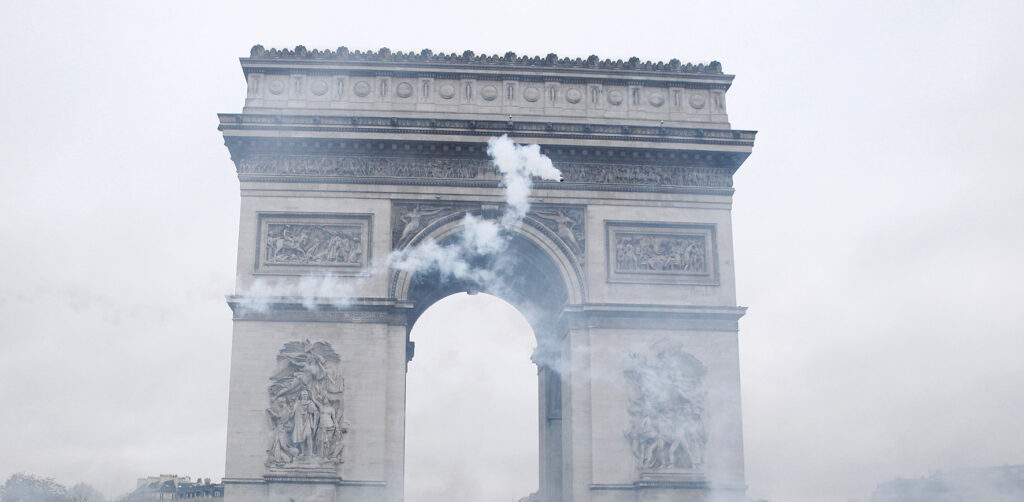Strained fraternity: Macron and France’s ‘allies’
Strained fraternity: Macron and France’s ‘allies’
Following the recent terrorist attacks in France, some media outlets have been more critical and European leaders have been less outspoken. Has the quietness of France’s European allies resulted in a weakening of fraternity between European countries?
Since September 2020, France has once again become the victim of a handful of terrorist attacks. The stabbing outside the former offices of Charlie Hebdo (25th September), the brutal beheading of Samuel Paty (16th October), and the fatal knife attack in Nice (29th October) have led to a strong clamp down from the French government, with President Emmanuel Macron passionately leading the movement to root out Islamist threats from the country.[1] However, compared to the 2015 Charlie Hebdo terrorist attack that resulted in the death of seventeen people and gripped the attention of global leaders, these recent attacks have generated a different set of responses. Immediately following these events, European and world leaders expressed their shock, sympathy, and solidarity with the French people.[2] Yet, as the weeks have passed, and President Macron has continued to pursue a hard-line approach to solving ‘Islamist separatism’,[3] European leaders have become less outspoken in their support. Additionally, some English-language media outlets have raised questions about France’s response to the attacks.[4] [5]
Macron’s reaction
The lack of support from media outlets has been clearly noted by Macron who expressed his frustration in a recent interview, claiming that instead of expressing solidarity with the French people, some media outlets have sought to “legitimise the violence” and blame France for the attacks they have experienced.[6] In particular, Macron noted that compared to the 2015 attacks, when media outlets around the world showed support for France, the same journalists are now claiming the real cause of these crimes are France’s “racist and Islamophobic” tendencies.[7] Yet, at the core, President Macron seems to be most hurt by the fact that the ‘founding principles’, that originated out of the Enlightenment and the 1789 French Revolution and have played significant roles in shaping European values, have, in his view, been “lost.” Instead, Macron maintains that the same countries that believed to share these French values have turned their backs and criticised their historic ally, meanwhile forgetting the significance of this shared fraternity of values.
Shared European values?
To further understand Macron’s concern, it is important to dig deeper into the values that arose out of the French Revolution and assess whether these shared ‘European values’ are still viable today.[8] The ethos of the First French Republic, reflected in the slogan of 1789 French Revolution Liberté, Egalité, Fraternité (Liberty, Equality, Fraternity), represented a new understanding of social and political beliefs.[9] Combined with a belief in democracy, human dignity, and tolerance, these values have historically united European countries and are still upheld by both the French government and members of the EU today.[10] These values represent a fraternity between such countries, a sense that nations are bound together in solidarity, something that Macron believes has diminished in recent weeks.
A step too far: the issue of laïcité
Alongside these values, the concept of laïcité, understood best as separation between church and state, arose out of the ideals of the First French Republic and was written into French government policy in 1905.[11] While some other European countries formally separate church and state, French laïcité differs. Whereas religion still plays a significant role in the politics of other countries that maintain a church/state separation (e.g. Sweden), France is ‘officially neutral’ in matters of religion.[12] [13] Therefore, compared to other values that align European countries, the impassioned French defence of laïcité has separated France from other EU states and could be seen as a central reason for the recent silence of European leaders and criticism of some media. Yet, while Macron has reasserted the need to defend secularism above all else, some commentators have suggested that some of France’s European friends are becoming more “inward looking” and less involved in the internal affairs of other countries, which could explain their quietness regarding the recent attacks.[14]
Moreover, British author Douglas Murray suggests that France’s European ‘allies’ have been more cautious because they are scared of dealing with the threat of radical Islam in Europe.[15] From all the EU countries, Dutch Prime Minister Mark Rutte was the only leader to state that they stand with Macron and “for the collective values of the European Union” after Turkish President Erdogan suggested Macron needed ‘psychiatric help’.[16] However, while Murray suggests that European leaders should be ashamed of their silence and that at the ‘most fundamental level’ French and European values are shared,[17] some commentators and politicians have suggested that the current French stance on laïcité puts European and global leaders in a compromised position. For example, in response to September’s Charlie Hebdo stabbing, Canada’s Prime Minister Justin Trudeau stated that “freedom of expression is not without limits,” echoing the concerns of Boualem Sansal, that if not controlled, freedom of expression may result in “exacerbating religious and racial tensions” rather than creating equality.[18] [19] Therefore, this could be one reason for the silence of European leaders in the wake of the recent French attacks.
Strained fraternity, strained future?
Thus, the reaction (or lack of it) of European leaders to the recent terrorist attacks in France and the subsequent fallout has highlighted a shift in the relationship between France and other countries, or more importantly, President Macron and other European leaders. Indeed, the issue of laïcité seems to expose the cracks in the perception that European countries share all values. If Macron continues to pursue his unshakeable defence of laïcité, France’s relations with allies could potentially be weaker in the long term.
Learn more about religion and society on the EARS Dashboard
[1]What has French president Macron said to outrage the Muslim world?
[2] Nizza, attentato in una chiesa: tre morti e un ferito grave. Macron: “Francia sotto attacco”. L’aggressore sbarcato a Lampedusa a settembre
[3] France’s Macron vows to fight ‘Islamist separatism’
[4] Man Beheads Teacher on the Street in France and Is Killed by Police
[5] As France mourns slain teacher Samuel Paty, some question secular values
[6] The President vs. the American Media
[7]The President vs. the American Media
[8]The President vs. the American Media
[9] The ideas of the French Revolution
[10] The EU values – About – ECL v2
[11] Secularism and Religious Freedom
[12]What is secularism and why is it causing such divisions in France?
[13] Church and state connected in most European countries
[14] Why is Britain silent on the murder of Samuel Paty?
[15]Macron alone: where are France’s allies in the fight against Islamism?
[16]Rutte condemns ‘unacceptable’ comments by Erdogan on Macron
[17] Macron alone: where are France’s allies in the fight against Islamism?
[18] Free speech has limits, Canada’s Trudeau says – World – DAWN.COM
[19] Boualem Sansal : «La France laïque, adversaire majeur des islamistes»






